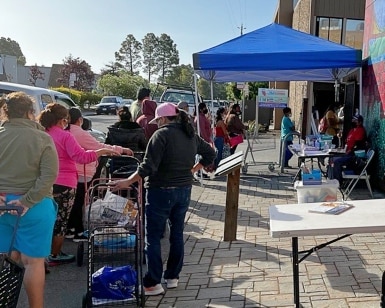Healthy Places Index Helps Community Members Identify Funding Priorities in Marin County’s Under-Resourced Neighborhoods
March 7, 2024
By: Public Health Institute

Highlights
The California Healthy PIaces Index is helping to engage Marin County community members from neighborhoods facing disproportionate economic, health and racial disparities to identify how $2.5M funding from the American Rescue Plan Act should be utilized to improve their communities.
California’s Marin County is making a transformative shift in public governance to directly empower community members in historically under-resourced neighborhoods and fund their chosen solutions to improve health and equity. The county used PHI’s Healthy Places Index (HPI) to identify neighborhoods facing disproportionate economic and racial health disparities and then prioritized them in the region’s first-ever participatory budgeting process—and ultimately disbursing a $2.5 million investment from the American Rescue Plan Act (ARPA) to local nonprofits.
HPI is a powerful data, mapping and policy platform, designed to identify opportunities to improve neighborhood health and help guide investments, programs, and policy changes to where they will have the strongest impact on life expectancy. The HPI provides overall scores, detailed data, and recommended actions on specific areas that shape health, like housing, transportation, education, and more. Higher HPI scores correlate with healthier community conditions and longer average life expectancy.
County leaders used HPI as an equity metric to identify neighborhoods that score under its 70th percentile—indicating that the areas are experiencing disproportionate economic and racial health disparities. The county then prioritized these neighborhoods in its participatory budgeting process and proposals, empowering community members to decide which solutions they wanted to invest in and guiding funding directly to local community-based organizations.
“
The first question we asked is how would they use $2.5 million to advance racial equity in their community. We invited community members to reimagine their neighborhoods and to dream of solutions that were rooted in abundance, self-determination and community wisdom”.Jamillah Jordan – Marin County’s Director of Equity
The participatory budgeting process also helps to shift power to community members as active participants in budgetary decisions—enhancing civic engagement, strengthening the democratic process and boosting social cohesion, which has been linked to better health outcomes.
HPI includes census response rates and voting indicators in its “Social” Policy Action Area. These measures capture aspects of ‘social cohesion,’ a recognized social determinant of health that are grounded in substantial research. Several studies, including in California, have established a clear link between social cohesion and health outcomes as it empowers community members to influence decisions affecting their health outcomes. Recognizing this, the HPI’s policy action guide elevates participatory budgeting as a strategy to enhance life expectancy.
Civic activities, like participatory budgeting, can counteract structural racism—a public health crisis characterized by policies and practices that perpetuate racial inequality. By honoring community wisdom, fostering a sense of belonging, and challenging systemic biases, participatory budgeting becomes a powerful tool in dismantling the isolating, adverse impacts of such injustices.
From palpable excitement and anticipation to a poignant acknowledgment of long-standing unmet needs, the initiative struck a chord with community members. The community’s active engagement is evident in the generation of 250 project ideas, garnering nearly 3,000 virtual “likes” and culminating in 104 formally submitted grant proposals. These proposals represent a blend of visionary, long-term initiatives aimed at systemic changes. Proposals encompass youth mentorship programs, climate resilience and preparedness initiatives, ancestral healing for women, cultural arts projects and more.
Out of these proposals, 24 projects ranging from $10,000 – $250,000 were selected for inclusion in the participatory budgeting Community Ballot. This voting process is also notably inclusive: it welcomes participation from anyone over 14 who lives, works, owns a business, or attends school in Marin County, regardless of immigration status or traditional voting eligibility. The winning projects were announced publicly in February 2024.
Some of the non-profits who received the largest funding awards included:
- Canal Alliance’s “Latino Community Health House” project will deploy Spanish-Spanish-speaking outreach workers to offer COVID-19 testing, health information, insurance assistance, behavioral health referrals and community-based education
- Griot Theater Co.’s Black and Brown Youth Theater project is offering a “theater-focused” learning experience for marginalized students
- Huckleberry Youth Program’s ACE Academy offers an academic and career program that prepares 1st generation youth for success during and after high school
- Enriching Lives Through Music’s Canal Culture of Excellence provides free music instruction to participants who are 8 to 18 years old
Eight projects were also awarded funding in the amount of $10,000.
While the inaugural participatory budgeting process represents a small fraction of the county budget, it serves as a foundational step towards cultivating healthier, more prosperous communities. And it’s already sparking dialogue across various other departments, laying the groundwork for a future where using the HPI to guide participatory methods become standard in budget processes across the county.
A version of this impact first appeared on the Public Health Alliance of Southern California website.